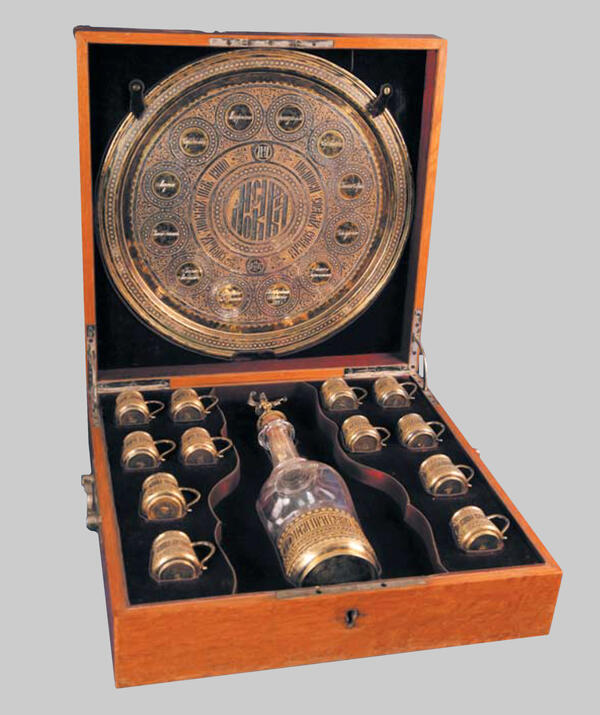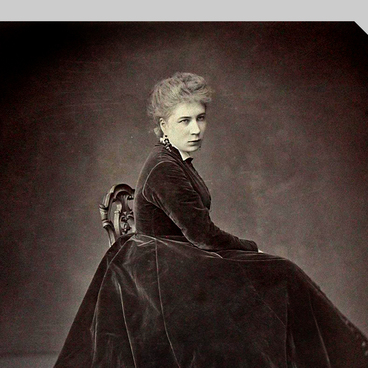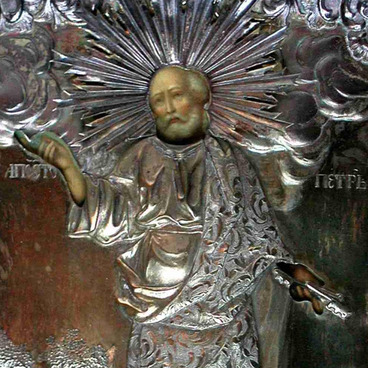A field bar was a regular companion of any traveler in the 19th century. This field bar was gifted to Pyotr Tchaikovsky by Moscow merchants on November 14, 1887, during the Second symphonic meeting of the Russian Musical Society in Moscow. That’s where one of the first concerts featuring exclusively Tchaikovsky’s work took place. Tchaikovsky himself was conducting the concert.
The field bar was custom-made for the composer by the VasIly Semyonov Silverware Factory; it comprises a tray, a carafe, and twelve charkas (small cups). The middle of each cup is emblazoned with a proverb, written in the Old Russian script. They include: ‘Drink and mind your business’, ‘He who doesn’t drink the wine doesn’t love the host’, ‘Even cabbage dries up without water’, ‘Drink to the bottom — the good is at the bottom’. Niello (a black mixture) was used to fill in the proverbs engraved on the metal surface.
At the concert during the Second symphonic meeting, Tchaikovsky performed his symphonic poem Francesca da Rimini, an arioso from The Enchantress, the Concert Fantasia for piano and orchestra, romances Wait! and So What? , the 1812 Solemn Overture, orchestral suite Mozartiana (premiere). The day after, Tchaikovsky wrote to his brother Modest: ‘I found last night’s concert very pleasant, for the public was incredibly enthusiastic. I received several precious gifts and numerous wreaths’.
Pavel Tretyakov, a famous patron of arts and founder of the Tretyakov Gallery, was among the dignitaries attending the concert on November 14. A concert with the same program was held the following day, but this time, it was open to the public. A week later, Russkiye Vedomosti (literally: Russian Chronicler) ran an article by a prominent music critic Nikolay Kashkin, titled “P. I. Tchaikovsky and Concerts of the Musical Society on November 14 and 15.” Kashkin reported: “As a conductor, Tchaikovsky rose to the occasion. He has everything it takes to be a leader of the orchestra: perfect composure, exceptional clarity, and precision in the wave of his hand… As a conductor, his manner is incredibly simple, and if he lacks the virtuosity of a bandmaster which one can only attain through long-term practice, he makes up for it with a quality one cannot acquire… the inner fire, the passion that inspires the orchestra and has an amazing effect one the audience, offering a well-rounded and charismatic performance”.
Although the concert was a big success, Tchaikovsky had been very anxious ahead of it. As he was about to go on stage, he actually experienced a “hysterical fit”, but after that, he appeared in front of the audience and ’…conducted better than ever before.’ Nevertheless, the emotional stress and agitation took their toll. Shortly after the concerts, the composer left for his retreat at Maydanovo, near Moscow, to recharge and recover.
The field bar was custom-made for the composer by the VasIly Semyonov Silverware Factory; it comprises a tray, a carafe, and twelve charkas (small cups). The middle of each cup is emblazoned with a proverb, written in the Old Russian script. They include: ‘Drink and mind your business’, ‘He who doesn’t drink the wine doesn’t love the host’, ‘Even cabbage dries up without water’, ‘Drink to the bottom — the good is at the bottom’. Niello (a black mixture) was used to fill in the proverbs engraved on the metal surface.
At the concert during the Second symphonic meeting, Tchaikovsky performed his symphonic poem Francesca da Rimini, an arioso from The Enchantress, the Concert Fantasia for piano and orchestra, romances Wait! and So What? , the 1812 Solemn Overture, orchestral suite Mozartiana (premiere). The day after, Tchaikovsky wrote to his brother Modest: ‘I found last night’s concert very pleasant, for the public was incredibly enthusiastic. I received several precious gifts and numerous wreaths’.
Pavel Tretyakov, a famous patron of arts and founder of the Tretyakov Gallery, was among the dignitaries attending the concert on November 14. A concert with the same program was held the following day, but this time, it was open to the public. A week later, Russkiye Vedomosti (literally: Russian Chronicler) ran an article by a prominent music critic Nikolay Kashkin, titled “P. I. Tchaikovsky and Concerts of the Musical Society on November 14 and 15.” Kashkin reported: “As a conductor, Tchaikovsky rose to the occasion. He has everything it takes to be a leader of the orchestra: perfect composure, exceptional clarity, and precision in the wave of his hand… As a conductor, his manner is incredibly simple, and if he lacks the virtuosity of a bandmaster which one can only attain through long-term practice, he makes up for it with a quality one cannot acquire… the inner fire, the passion that inspires the orchestra and has an amazing effect one the audience, offering a well-rounded and charismatic performance”.
Although the concert was a big success, Tchaikovsky had been very anxious ahead of it. As he was about to go on stage, he actually experienced a “hysterical fit”, but after that, he appeared in front of the audience and ’…conducted better than ever before.’ Nevertheless, the emotional stress and agitation took their toll. Shortly after the concerts, the composer left for his retreat at Maydanovo, near Moscow, to recharge and recover.



